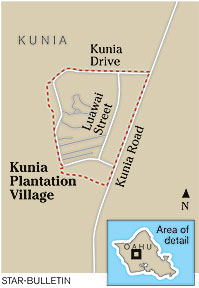DENNIS ODA / DODA@STARBULLETIN.COM
The city is saving Kunia Plantation Village from demolition thanks to a deal worked out with the James Campbell Co., Honolulu Mayor Mufi Hannemann said yesterday. The Hawaii Agriculture Research Center bought the 119 acres for $1. Here, Charles Cabucana, who is retired after working 13 years for Del Monte, worked yesterday in his garden.
|
|
$1 saves Kunia homes
STORY SUMMARY »
Most Kunia Plantation Village residents, who had feared eviction after Fresh Del Monte Produce Inc. shut down in 2006, will be able to remain in their homes under a new plan announced yesterday by Mayor Mufi Hannemann.
The James Campbell Co., which owns the 119-acre property in Kunia, agreed to transfer ownership to the nonprofit Hawaii Agriculture Research Center for $1. This deal would ensure that the homes will remain affordable and preserve the historic plantation village lifestyle, a piece of Hawaii's history that has been declining as development grows.
"This is a key piece for us to keep the agriculture corridor in Kunia productive as we fight to retain labor, especially in today's economy," said Dean Okimoto, president of the Hawaii Farm Bureau.
Most residents, who are former Del Monte workers, living in the 115 homes on the plantation village expressed relief and joy yesterday.
FULL STORY »
Loma Corderos has lived in the same Kunia Plantation Village house all her 56 years.
Company lets city use Kapolei land
The James Campbell Co. agreed yesterday to dedicate several acres of land in Kapolei for the city to use. Mayor Mufi Hannemann announced several proposals, which require City Council approval, to benefit Kapolei:
» 16 acres of land for government offices and a mass transit stop in Kapolei
» 2 acres of land for day care facilities
» 1.5 acres for a fire station in Campbell's proposed Makaiwa Hills residential development
» More affordable housing units, including 720 units in the planned Kapolei West development and 1,230 in Makaiwa Hills, which includes the 115 already in Kunia Plantation Village
|
Her grandfather first moved into the four-bedroom wooden home. She grew up several houses away from a boy a few years older who later became her husband.
Since 2006, Corderos -- along with the other families living in Kunia Plantation Village -- feared they would be forced to leave their homes after their employer, Fresh Del Monte Produce Inc., shut down.
But residents can stop worrying thanks to a complex deal Mayor Mufi Hannemann announced yesterday that would allow most of them to stay.
"I'm so relieved," said Corderos, whose husband was a Del Monte worker. "It was really shaky back in 2006. Everyone was worried. Everyone knows each other here. We like living in the country. No one wanted to leave."
The James Campbell Co. agreed to transfer the 119-acre village for $1 to the Hawaii Agriculture Research Center, which will take over the property on Jan. 1. Under this agreement, the research center, a nonprofit organization, will keep the housing affordable and will rent the units to agriculture workers and retired Del Monte workers.
 "It would guarantee that these homes remain affordable in perpetuity," Hannemann said yesterday at a news conference. "And that's important."
"It would guarantee that these homes remain affordable in perpetuity," Hannemann said yesterday at a news conference. "And that's important."
Rent has increased significantly since Del Monte shut down, residents said. The Corderoses paid about $300 a month in 2006, compared with the more than $900 a month they pay now.
David Kula, controller for the Hawaii Agriculture Research Center, said the organization does not anticipate rents increasing in 2009. The group is concentrating on renovating several old business offices on the property that would generate revenue to subsidize the costs to avoid increasing rent.
Hannemann added that having these affordable rentals available can help retain and recruit workers into agriculture, an industry seeing declining interest because there are higher-paying jobs available.
But of the estimated 110 families living in the plantation village, about one-third will be forced to move because they are no longer agriculture workers or retirees. There are 115 homes there.
DENNIS ODA / DODA@STARBULLETIN.COM
A $1 land sale will allow most Kunia Village Plantation residents to remain in their homes. Pedro Trinidad, shown with his wife, Sionita, said he worked for Del Monte for more than 40 years, from 1966 to 2007. They lived on Molokai, and when that operation shut down, they were moved to Kunia. He retired last year, and they both said they enjoy living in Kunia (their home is in the background).
|
|
Fred Galdones, president of the International Longshore and Warehouse Union Local 142, said the union had searched unsuccessfully for other deals that would have let all the residents -- many of whom are former union members -- stay.
"While this is not a perfect solution ... we are pleased that Kunia Plantation Village can continue to provide affordable housing for agriculture employees," said Galdones, who called on city and state agencies to aid displaced residents.
Galdones said he would have preferred a system where residents could buy their homes.
Kula said that by leaving the units as affordable rentals, it ensures cheaper housing for agricultural workers in the long run.
Under the deal, the city would count the 115 units in Kunia Plantation Village toward the 1,230 affordable housing units that the Campbell Co. must build in its planned Makaiwa Hills development in Kapolei. The company also agreed to upgrade the fire system for the plantation village at a cost of $1 million.

